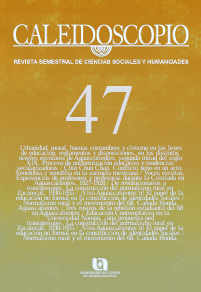Hiring Model in Micro and Small Businesses in Mexico’s High Specialized Textile Communities
DOI:
https://doi.org/10.33064/47crscsh3727Keywords:
game theory, signaling games, micro and small businesses, highly specialized communitiesAbstract
In this article we analyze and propose a model of the hiring process in micro and small businesses in specialized communities using a game theory approach. The objective is to find mechanisms of operation of the local productive systems that allow to identify beliefs and strategies that establish forms of production that presuppose a communal benefit. The evidence shows that locally organized micro and small businesses constitute a labor market that takes advantage of social capital that helps employers and workers to overcome restrictions, maintain the level of employment and share knowledge that makes entrepreneurship possible; community values together with the knowledge that is shared culturally and productively represent key factors that help strengthen economies in a precarious social context. The reflection produced by this exercise refers to how local agreements help standardize knowledge and skills that define a way of producing locally.
Downloads
References
Akerlof, G. (1970). The market for “Lemons”: Quality Uncertainty and the Market Mechanism. The Quarterly Journal of Economics, 84(3), 488–500. https://doi.org/10.2307/1879431
Akerlof, G. (1982). Labor contracts as partial gift exchange. The Quarterly Journal of Economics, 4(97). https://doi.org/10.2307/1885099
Alba Vega, C., Lins Ribeiro, G., y Mathews, G. (2015). La globalización desde abajo. La otra economía mundial. Fondo de Cultura Económica.
Arévalo, J. (2004). Teoría de juegos de negociación: una visión general. Sociedad y Economía, 7, 45–64. https://www.redalyc.org/articulo.oa?id=99617647003
Aumann, R. (1997). Rationality and Bounded Rationality. Games and Economic Behavior, 21(GA970585), 2–14. https://doi.org/10.1006/game.1997.0585
Carreto Sanginés, J. (2013). Marshall y los sistemas productivos locales. Economía Informa, 383, 90–106. https://doi.org/10.1016/S0185-0849(13)71343-4
Chávez, M. y Maza, O. (2017). El camino a Textitlán, avances para un concepto de comunidades altamente especializadas. Trabajo (14), 133–162. http://www2.izt.uam.mx/sotraem/Documentos/RevistaTrabajo14.pdf
Chiapello, E., y Boltanski, L. (2002). El nuevo espíritu del capitalismo. Akal
Durand, J. P. (2011). La cadena invisible. Flujo tenso y servidumbre voluntaria. Fondo de Cultura Económica.
Elster, J. (2010). La explicación del comportamiento social. Más tuercas y tornillos para las ciencias sociales. Gedisa editorial.
Granovetter, M. (1985). Economic action and social structure: The problem of embeddedness. American Journal of Sociology, 91(3), 481–510. https://doi.org/10.4324/9780429494338
INEGI. (2010). Zonas Metropolitanas de los Estados Unidos Mexicanos. Instituto Nacional de Estadística y Geografía (Vol. 2). INEGI.
INEGI. (2020). Directorio Estadístico Nacional de Unidades Económicas. https://www.inegi.org.mx/app/mapa/denue/?ag=17
Light, I. (2005). The Ethnic Economy. En N. J. Smelser y R. Swedberg (Eds.), The Handbook of Economic Sociology, Second Edition (STU-Stud, pp. 650–677). Princeton University Press. https://doi.org/10.2307/j.ctt2tt8hg.32
Maza, O. (2015). Balance sobre los estudios laborales en México: atipicidad, trabajo precario y nuevos modelos de trabajo. En Maza y Ortiz (Eds.) En el mismo barco. Reflexiones sobre la producción, el trabajo y las redes sociales: el caso de Uriangato, Gto. (pp.71–94). Universidad Autónoma de Aguascalientes.
Ostrom, E., y Ahn, T. K. (2003). Una perspectiva del capital social desde las ciencias sociales: capital social y acción colectiva. Revista Mexicana de Sociología, 65(1), 155–233. https://doi.org/10.2307/3541518
Pérez, A. (2015). Monografía. En En el mismo barco. Reflexiones sobre la producción, el trabajo y las redes sociales: el caso de Uriangato, Guanajuato. (p. 230). Universidad Autónoma de Aguascalientes.
Plata, L. (1999). Amartya Sen y la Economía del Bienestar. Estudios Económicos, 14(1), 3–32. http://estudioseconomicos.colmex.mx/archivo/EstudiosEconomicos1999/3-32.pdf
Portes, A., y Haller, W. (2005). The Informal Economy. En N. J. Smelser y R. Swedberg (Eds.), The Handbook of Economic Sociology, Second Edition (STU-Stud, pp. 403–426). Princeton University Press. https://doi.org/10.2307/j.ctt2tt8hg.22
Sen, A. (1993). Capability and Well-Being. In Nussbaum & Sen (Eds.), The Quality of Life. Clarendon Press.
Spence, M. (1973). Job Market Signaling. The Quarterly Journal of Economics, 87(3), 355–374. https://doi.org/10.2307/1882010
Varman, R., y Costa, J. (2008). Embedded markets, communities, and the invisible hand of social norms. Journal of Macromarketing, 28(2), 141–156. https://doi.org/10.1177/0276146708314594
Vega, C. A., y Kruijt, D. (1995). La utilidad de lo minúsculo, 125. El Colegio de México. https://doi.org/10.2307/j.ctv6jmx8s
Downloads
Published
How to Cite
Issue
Section
License
Copyright (c) 2022 Dolly Anabel Ortiz Lazcano, Julio César Macías Ponce

This work is licensed under a Creative Commons Attribution-NonCommercial-ShareAlike 4.0 International License.
Licencia Creative Commons Atribución-NoComercial-CompartirIgual 4.0 Internacional
El lector es libre de compartir o adaptar el material en cualquier medio o formato bajo las condiciones siguientes: (a) debe reconocer adecuadamente la autoría, proporcionar un enlace a la licencia e indicar si se han realizado cambios; (b) no puede utilizar el material para una finalidad comercial y (c) si remezcla, transforma o crea a partir del material, deberá difundir sus contribuciones bajo la misma licencia que el original.
Resumen de la licencia
https://creativecommons.org/licenses/by-nc-sa/4.0/deed.es_ES
Texto completo de la licencia
https://creativecommons.org/licenses/by-nc-sa/4.0/legalcode
Cada autor es responsable del contenido de su artículo. En el caso de un texto colectivo, el primer autor asume la responsabilidad intelectual de los resultados del proceso editorial; los autores son responsables de obtener la licencia de autor para reproducir materiales gráficos o fotográficos que pertenecen a terceros.
Los autores asumen plena responsabilidad en el caso de falsificación de datos o falta de autenticidad en la investigación. Se comprometen, también, a no reutilizar trabajos ya publicados, total o parcialmente, para presentarlos en otra publicación.
Estas condiciones aplican tanto a la versión impresa como a la versión electrónica de la revista.


















